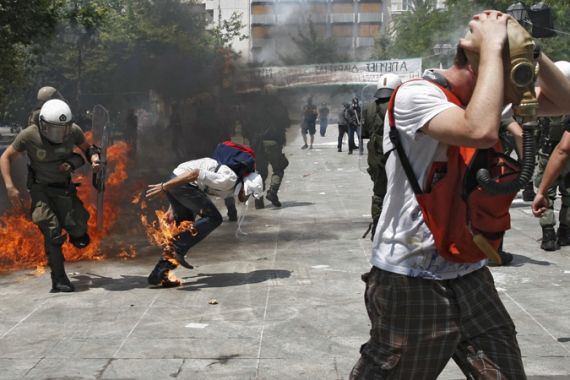Strike protests in Athens turn violent
Demonstrators clash with riot police as Greek parliament debates austerity steps to help country secure bailout funds.

A 48-hour general strike is under way in Greece as the country’s parliament debates a new round of austerity measures that will help the government secure loans it says are necessary to stave off the threat of bankruptcy.
Protests held as part of the strike in the capital, Athens, on Tuesday turned violent after demonstrators, many wearing gas-masks and scarves covering their faces, hurled rocks and pieces of broken masonry at riot police. Some reports indicated that protesters had also thrown homemade fire bombs.
The police responded by firing tear gas, detaining 18 protesters and laying formal arrest charges against three.
Twenty-one police officers were injured in the clashes, officials said. They also said that one person had been stabbed during fights between rival groups of protesters, with three others left injured.
Violence continued through the afternoon, with protesters seen setting fire to at least two vehicles they mistook for being television trucks.
At its height, the crowd had been about 20,000-strong.
Broad cross-section
Al Jazeera’s Mike Hanna, reporting from Athens, said that the protesters represented a broad cross-section of Greek society.
“Early on in the day, it was very peaceful scenes, when there were tens of thousands of people marching around Syntagma square here in the very centre of Athens. Now … most of those marchers are no longer here,” he said.
“Interestingly enough, those marchers were from a complete cross-section of Greek society: it was young and old, it was very much a working-class protest. The unions who had called this 48-hour strike were in the forefront.”
| IN DEPTH | |||||||||||||||
|
Our correspondent said the violent outbreaks were being seen as a “sideshow” to the actual protest.
“The bulk of the Greek population is absolutely furious at a government that they say is attempting to blame them for mistakes that it made in the past,” he said.
The strike, which began on Tuesday, is set to disrupt or halt most public services as Greek parliamentarians deliberate over an austerity package which they must pass for the country to access the latest installment in a series of international bailout payments.
The strike has been called by unions who say the proposed €28bn ($40bn) cuts would slap taxes on minimum wage earners and other struggling Greeks, already hurting from previous rounds of cuts.
“These measures are a massacre for workers’ rights. It will truly be hell for the working man,” said Thanassis Pafilis, a lawmaker with the Greek Communist Party that will lead one of Tuesday’s main rallies.
“The strike must bring everything to a standstill.”
Al Jazeera’s Barnaby Phillips, reporting from Athens, said there had been disruption at the nearby port of Piraeus, a key route for tourists and Greeks travelling to the country’s many islands.
“Tourism has been hit very badly… This, in fact, is the first 48-hour general strike that Greece has experienced since the end of military rule in the mid-1970s,” he said.
Main port picketed
The main seamen’s union at Piraeus is not officially on strike, but around 200 members of a communist union and a port employees’ union picketed the port to prevent ferries from leaving.
More than 5,000 police were on duty in Athens’ city centre, as union protest rallies gathered outside the parliament building.
While buses and trams are not running, Athens metro drivers and other employees on the subway system decided not to strike “so as to allow Athenians to join the planned protests in the capital”.
Protesters have been joined by doctors, ambulance drivers, journalists and even actors at a state-funded theatre.
Public administration offices and banks are closed, hospitals are operating with reduced staffing and Greek media will down tools for five hours on each of the two days.
Stoppages by air traffic controllers have also disrupted flights within Greece and to international destinations.
The move comes a day after French banks reached an outline agreement to roll over holdings of maturing Greek bonds as part of a wider European plan to avoid sovereign default.
‘Patriotic duty’
George Papandreou, the prime minister, begged the Greek parliament late on Monday to do its “patriotic duty” and vote to keep the country “on its feet”.
“In theory he has a narrow majority to push this austerity package through,” said our correspondent.
“Most people think he will just about scrape through, as he did last week with that confidence vote.”
The package and implementation law must be passed by parliament this week so the European Union and the International Monetary Fund release the next installment of Greece’s €110bn ($156bn) bailout loan.
Without it, Greece faces the prospect next month of becoming the first eurozone country to default on its debts – a potentially disastrous event that could drag down European banks and affect other financially troubled European countries.
Papandreou said he hoped the terms of a second bailout would be better than the first, which was agreed last year.
“I call on Europe, for its part, to give Greece the time and the terms it needs to really pay off its debt, without strangling growth, and without strangling its citizens,” he said.
